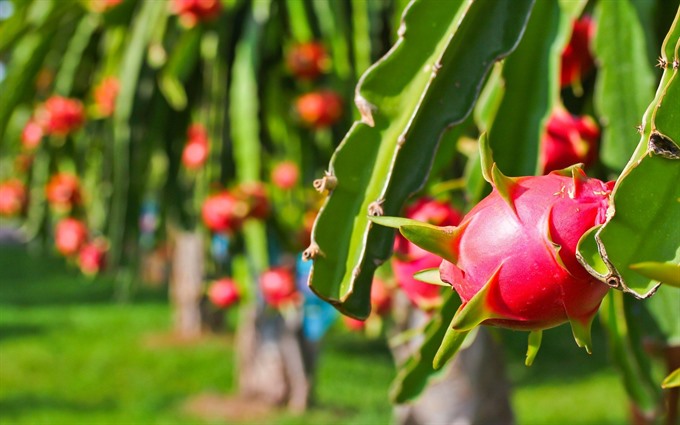 Economy
Economy

The price of dragon fruit in the central province of Bình Thuận, the country’s largest producer of the crop, has fallen significantly in the last two weeks.
 |
| Bình Thuận province produces more than 500,000 tonnes of dragon fruit each year. — Photo ndh.vn |
HÀ NỘI — The price of dragon fruit in the central province of Bình Thuận, the country’s largest producer of the crop, has fallen significantly in the last two weeks.
Although prices are low, traders are still unwilling to purchase this kind of fruit.
In Hàm Chính Commune (Hàm Thuận Bắc District), many dragon fruit farmers are looking for buyers.
According to some farmers, the price of dragon fruit declined sharply after the Mid-Autumn festival. It fell from a range of VNĐ10,000 to VNĐ15,000 (US$0.43 to $0.64) per kilo to VNĐ700 - VNĐ2,000 per kilo.
Farmer Ngô Minh Hải in Bình An Village, Hàm Chính Commune has 500 trees full of ripe fruit with an estimated yield of over three tonnes.
For weeks, his family has struggled to make ends meet because dealers demand an unreasonably low price or refuse to buy dragon fruit altogether. Hải’s wife said around the Mid-Autumn festival, one trader offered to buy some of their fruit at VNĐ7,500 per kilo but the family decided not to sell until the whole garden ripened.
A week later, the price had dropped to VNĐ3,000 per kilo. Acknowledging their mistake and accepting the loss, the family decided to sell their ripe fruit. But at that point, traders had stopped buying.
Trương Văn Ba’s family in Thắng Hiệp village (Hàm Thắng Ward, Hàm Thuận Bắc District) found themselves in a similar situation. With nearly 1,000 trees planted on 1ha area, they also decided to let their fruit ripen before finding a buyer.
Ba said that prices have never been so low in his many years of growing dragon fruit.
Some traders say higher-than-normal yields have caused the price drop. Traders cannot sell fruit as quickly as it ripens, and some markets have started consuming less dragon fruit.
Bình Thuận province has more than 27,000 hectares of dragon fruit with a total output of over 500,000 tonnes per year. It is grown mostly in Hàm Thuận Nam, Hàm Thuận Bắc and Bắc Bình Districts.
Dragon fruit is mainly exported to China, Japan, the Netherlands, and the US. — VNS




